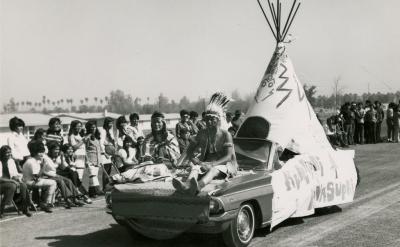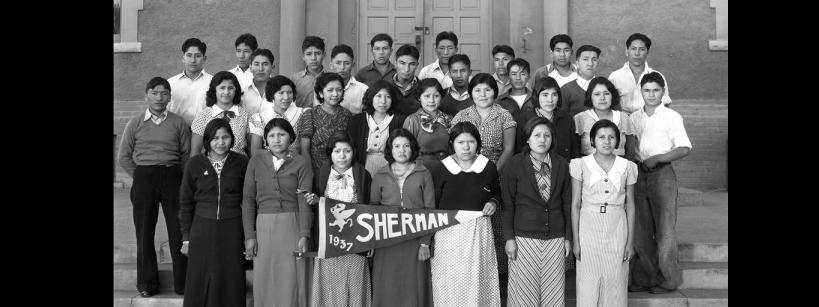Exhibition
Sherman Indian School: 100+ Years of Education and Resilience
July 23, 2023 – May 26, 2024


In the late 1800s, the United States’ federal government policy or planned action for Native communities was assimilation or integrating Native communities into the American way of life. One way the government set out to do this was by creating Indian schools for re-education. The federal government’s Bureau of Indian Affairs (BIA) established Indian schools where Native American students could be formally educated and “civilized” through a strict program of Western academics, vocational training in agriculture and manual labor jobs, and Christian religious teachings. Some were on reservations, some off-reservation, some were day schools, some boarding schools and others were church-run, supported by the federal government.
The U.S. government created and/or funded 408 federal Indian boarding schools where students were sent to (some by force) far away from their families and tribal communities. In 1892, they opened an off reservation boarding school for Native children in Perris, California relocating it in 1903 to the nearby town of Riverside called Sherman Institute. Since then, Sherman Institute (now Sherman Indian High School) has been a school, a home, and at times, a prison. Of the twenty-five off reservation boarding schools established, Sherman is one of four that still remains today. The Autry exhibition Sherman Indian School: 100+ Years of Education and Resilience explores the complex history of one of the last federal off-reservation boarding schools and its influence on generations of Native people.
Educational resources for Sherman Indian School: 100+ Years of Education and Resilience exhibit include videos and primary sources from the exhibit with suggested teaching tips and additional resources from other institutions.
Video: “Sherman Institute, 1915” - Early promotional film to encourage public support for Sherman Institute.
Video: “Sherman Lifeways” -Sherman Indian Museum Director and Cultural Traditions Leader Lorene Sisquoc and her deep connection with the school’s history.
Video: “Indian Flower Day” - Student health and education at Sherman Institute.
Primary Source Collection: Native American Boarding Schools
National Native American Boarding School Healing Coalition: Interactive Digital Map of Schools, Graphics, Curriculum and more
Federal Indian Boarding School Initiative: Official Lists and School Summaries; School Maps
Heard Museum: Away From Home: American Indian Boarding School Stories
Molly and Neal Brockmeyer · David F. Eisenberg · The Georgina-Fredrick Children's Foundation · The Max and Victoria Dreyfus Foundation · Christy McAvoy · Robert E. Ronus · Brenda and Gary Ruttenberg · The Steinmetz Foundation · Virginia F. Stevenson · Thelma Pearl Howard Foundation
The Autry Museum of the American West acknowledges the Gabrielino/Tongva peoples as the traditional land caretakers of Tovaangar (the Los Angeles basin and So. Channel Islands). We recognize that the Autry Museum and its campuses are located on the traditional lands of Gabrielino/Tongva peoples and we pay our respects to the Honuukvetam (Ancestors), ‘Ahiihirom (Elders) and ‘Eyoohiinkem (our relatives/relations) past, present and emerging.
4700 Western Heritage Way
Los Angeles, CA 90027-1462
In Griffith Park across from the Los Angeles Zoo
Map and Directions
Free parking for Autry visitors
MUSEUM AND STORE HOURS
Tuesday–Friday 10:00 a.m.–4:00 p.m.
Saturday–Sunday 10:00 a.m.–5:00 p.m.
DINING
Food trucks are available on select days, contact us for details at 323.495.4252.
The cafe is closed temporarily until further notice.